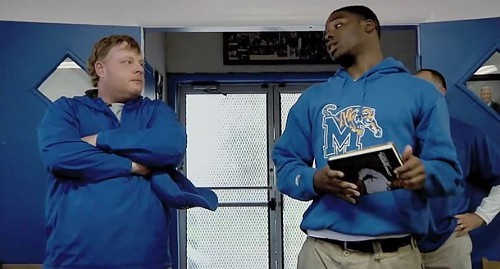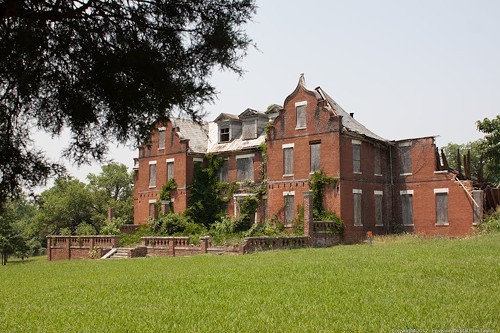We put that building to the best use of its life,” Doug Easley says. I feel good about that.”
He can. Although Easley and business partner Davis McCain no longer work in the former Easley-McCain studio on Deadrick, they take pride in recording more than two decades of music that succeeded in both commercial and cultural terms. The building burned in March of 2005, forcing the two to leave it behind. But the legacy of influential music endures.
Both Easley and McCain were set on sound from their childhoods.
“I was just fascinated with my father’s Dictaphone,” McCain says. “So they got me a recorder, and I would experiment with that all the time. I was always into it. I remember getting a small reel-to-reel recorder as a child. I always knew I wanted to do something in music. I went to Rhodes. I had actually planned on going into electronics, and I was convinced to go to college. I ran live sound at the pub on campus. Then I got the gig at the Antenna Club and stayed there until 1988.”
Easley seemingly was fated for music:
“I had big brothers,” Easley says. “They had gold records hanging on the wall down the street. A couple of the Box Tops lived on the street. Hombres, Chilton, those people all lived in my neighborhood at the time. I went to Messick High School. Duck Dunn, Cropper, and all that stuff. I think I was in the seventh grade, and I managed a band.”
Easley ran through several iterations of studios, often working from his home. But with the collection of Stax gear, the place was nothing like today’s home studios. And the list of collaborators and clients was impressive:
“We had people like REM guys come through,” Easley says. “When they were in town, we’d snag ’em. Ross Johnson. Peter Buck says the first lead guitar he ever played was in some sessions with Ross Johnson in the bedroom. I remember him stringing my Strat up.
“Everybody was convening at the Antenna Club. And we did a single with [McCain’s] band, [Barking Dog], in the house. Tav, maybe his first or second single, live. That sort of got a bug going. A do-it-yourself, don’t-wait-for-somebody-to-give-you-a-job attitude. To me, it basically started post disco. Memphis was at the lowest possible place it could be. Everybody had left town who was doing it in the old style. So they couldn’t stop us. So we just bought stuff and did it. I didn’t have faith in anybody giving me a job. Then I built another place behind my house; me and my dad. That was where Davis came in. We were looking for a space.”
When they found the Deadrick building, it was a fine mess. Originally built by a business partner of Chips Moman as a second facility for American Studio, the place was a mess when Easley-McCain Recording was formed in 1990.
“It had water damage, and termites had totally eaten the control room out. It was in really bad shape,” McCain says.
“When we got there, we had aspirations to do something,” Easley says. “It was ripe. It was a real good time. It was the beginning of the do-it-yourself era. The home studio I had was one of the few that weren’t catering to the old stuff. But there were bands, Dave [Shouse] had the Bud band [Band Called Bud]. They had their eye outside of Memphis. It was all about exporting to make it work. The records sort of helped that happen. A few would get out of town and did, and that helped us. That would promote it and tell people what was going on. It sort of snowballed.”
“Once the out-of-towners started coming, then the phone started ringing a lot,” McCain says. “If you go back and look at our calendars, they are just full. We would try to schedule ourselves days off, and then that would get covered up. It was a very busy time.”
Their success came through hard work at a time when marketing your studio didn’t involve Facebook or MySpace, or even email.
“It was all very old school,” Easley recalls. “I still have that beautiful-looking cell phone. It was a big old son of a gun.”
The major component to their success was being in tune with the culture. As Cobain was struggling with his disgust over commercial music, the scene around Easley-McCain was guided by Chilton’s experience with pop, his revulsion to it, and his artistic answer to it.
“I think it’s that we connected with what was going on everywhere except here, “Easley says. “They were bringing in music we’d never heard: the way they played and the way they tuned. They weren’t even playing blues and rock-and-roll, or rockabilly or whatever.
“We were sort of a development studio, in a sense. Like Wilco’s first record. Wilco wasn’t Wilco until they did their first record. We did their first record. White Stripes did their first record that sort of made them superstars. Then we do Sonic Youth, which I think was their ninth record. And then Jeff Buckley’s follow up to a big record he did. Then Pavement. Then a bunch of emo bands. It was all over the place.”
But their successes came with people who continue to define popular music.
“The White Stripes is a crazy example of something working,” Easley says. “I think they spent $1,700. It was a slow go, it took a couple of years for that to take off.” White Blood Cells was engineered by Stuart Sikes, a house engineer who moved to Dallas in 2002 and built Elmwood Recording before moving to Austin in 2012.
“But you don’t see that at the time,” McCain adds. “You wouldn’t even stop and listen to it after it went out the door. There was another one behind it.”
Their reputation extended beyond the underground scene. There was even one that got away.
“The one that I was having palpitations about was Bob Dylan” Easley says. “It ended up being the record of the year that year. He wanted to record in Memphis. I talked to Daniel Lanois for a long, long time on the phone. It never materialized.”
But Jack White’s production of Loretta Lynn’s Van Lear Rose would find the studio associated with some very mainstream success. The album was mixed by engineer Stuart Sikes and won the Best Country Album Grammy in 2005.
“I think we had done two country sessions,” Easley recalls. “And I’m sure the other one was horrible. But it was a beautiful country record in that it aligned Detroit, Memphis, and Nashville in this cool way.”
The two were later in Nashville when a woman asked them what they did. Easley mentioned Van Lear Rose.
“She said, ‘Horrible record. Just a horrible record.’ And I went, ‘Yes!'”
The studio was lost to fire in 2005. The owner opted not to rebuild.
“We managed to pull a lot out,” McCain says. “Doug worked on it.”
“I’m stubborn,” Easley says. “It was an interesting time for Memphis not to be in the old school. It was the beginning of a new school.”
They’re still at it: easleymccainrecording.com.
An earlier version of this article omitted the contributions of Stuart Sikes, who engineered the White Stripes’ White Blood Cells and returned to Easley from Texas to mix Van Lear Rose. We regret the error — JB

